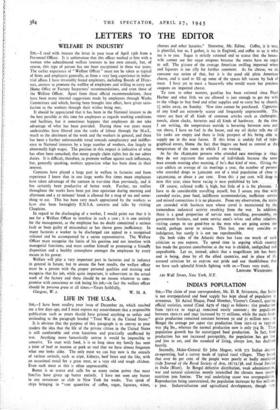LIFE IN THE U.S.A.
SIR,—I have been reading your issue of December 29, which reached me a few days ago, and I must express my astonishment that a responsible publication such as yours should have printed anything so unfair and misleading as the paragraph headed "Total War in the United States."
It is obvious that the purpose of this paragraph is to convey to your readers the idea that the life of the private citizen in the United States is still comfortable and even luxurious and practically unaffected by war. Anything more fantastically untrue it would be impossible to conceive. To start with food, it is so long since my family has seen a joint of beef or mutton or pork or veal that we have almost forgotten what one looks alike. The only meat we can buy now is the entrails of various animals, such as tripe, kidneys, beef heart and the like, with an occasional oxtail for a great treat, or a very old and tough chicken. Even such meat as this is often unprocurable.
Butter is so scarce and calls for so many ration points that most families have given up butter entirely. I have not seen any butter in any restaurant or dub in New York for weeks. You speak of ships bringing in "vast quantities of coffee, sugar, liqueurs, wines, cheeses and other luxuries." Nonsense, Mr. Editor. Coffee, it is true, is plentiful, but so, I gather, is tea in England, and coffee to us is what tea is to you. Sugar is strictly rationed and so scarce that the house- wife cannot use her sugar coupons because the stores have no sugar to sell. The picture of the average American swilling imported wines and liqueurs is too silly for further comment. As for cheese, we do consume our, ration of that, but it is the good old plain American cheese, and is used to fill up some of the spaces left vacant by lack of meat. I have yet to meet a housewife who would waste her precious coupons on imported cheese.
To turn to other matters, gasoline has been rationed since Pearl Harbor and what little we are allowed is just enough to get my wife to the village to buy food and other supplies and to carry her to church, 31 miles away, on Sunday: New tires cannot be purchased. Cigarettes of any kind' are extremely scarce and frequently unprocurable. The stores are bare of all kinds of common articles such as clothespins, towels, alarm clocks, batteries and all kinds of hardware. At the time I am writing, the temperature outside is hovering between zero and ten above, I have no fuel in the house, and my oil dealer tells me all his tanks are empty and there is- little prospect of his being able to supply me in the near future. If this letter is unduly full of typo- graphica errors, blame the fact that fingers are hard to control at the temperature -of the room in which I am writing.
As for the i8,000,coo persons who attended race meetings it. 1944, they do not represent that number of individuals because the same Man attends meeting after meeting, if he's drat kind of man. Giving the race addicts an average of six meetings a year, the number of persons who attended drops to 3,000,000 out of a total population of close to 140,000,000, or about 2 per cent. Even this 2 per cent, will drop to zero this year, since horse racing is now prohibited by law. Of course, railroad traffic is high, but little of it is for .pleasure. have to do considerable travelling myself, but I assurn you that with crowded trains, poor food, indifferent accommodation, inefficient service and missed connections it is no pleasure. From my observation, the trains are crowded with business men whose travel is necessitated by the tremendous industrial activity resulting, from the war. In addition, there is a good proportion of service men travelling, presumably, on government business, and some service men's wives and other relatives, visiting camps to say good-bye to the men who are going across the world, perhaps never to return. -This last, you may consider an indulgence, but surely it is not too reprehensible. On both sides of the Atlantic there has been too much of such criticism as you express. To spend time in arguing which country has made the greatest contribution to the war is childish, undignified and unprofitable. Let us, instead, admit that a magnificent job has been, and is being, done by all the allied countries, and in place of ill- natured criticism let us express our pride and our thankfulness that we have such splendid friends fighting with us.—Yours very truly, LEONARD WICKENDEN. 120 Wall Street, New York, N.Y.


























 Previous page
Previous page